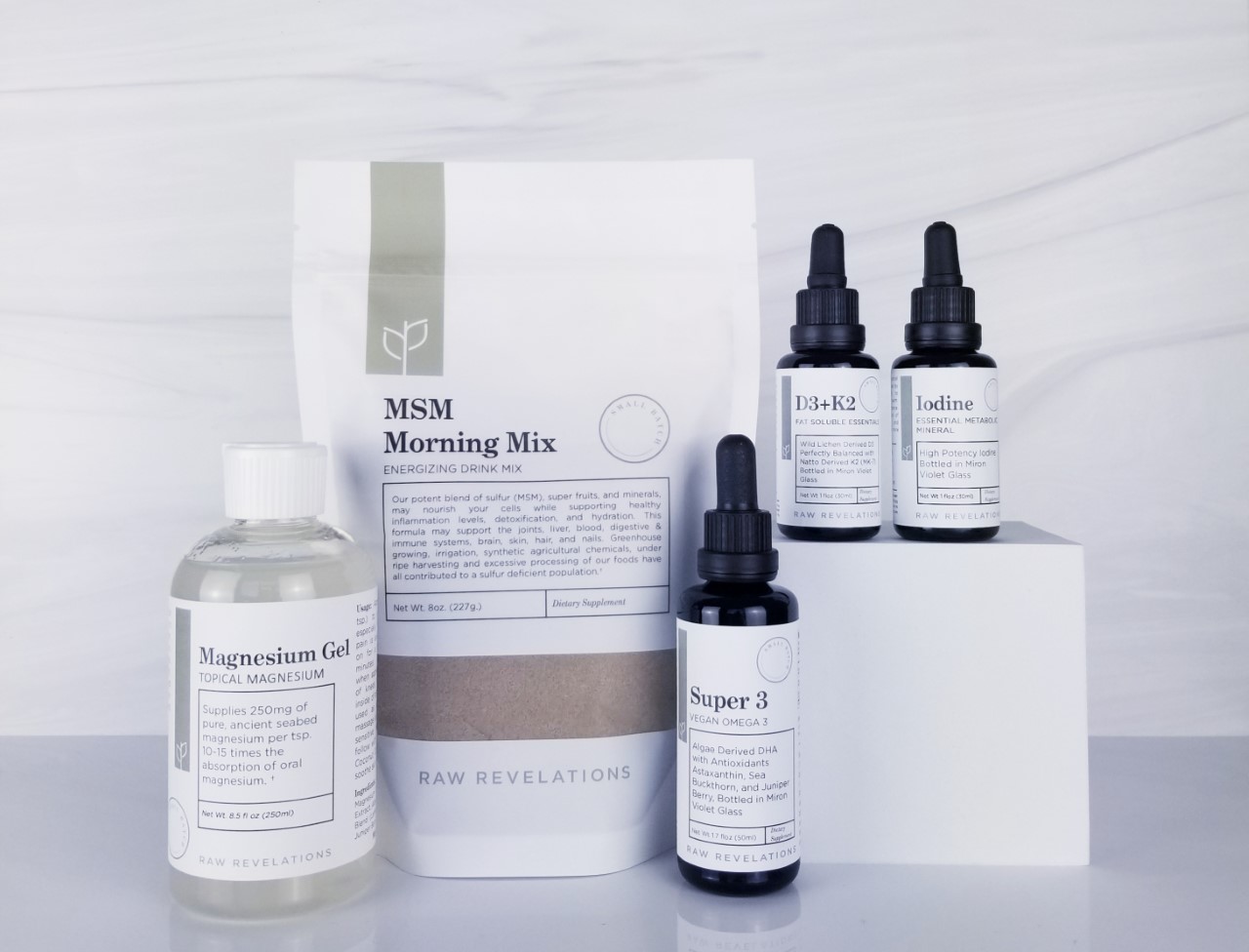Posted by Raw Revelations on Sep 10th 2015
Five Essential Nutrients You Should be Taking
With so many choices of vitamins and supplements on the market, and so many choices out there, I am going to present my take of the top five nutrient essentials. I have had the opportunity to work directly with my community and experience which nutrients really made a difference in peoples health. They came back surprised that they actually felt a big difference from taking these nutrients. Below I will be discussing these nutrients in little known detail in order to help you understand why they should be part of your nutrition strategy.
MSM (Organic Sulfur)
Sulfur originates from the ocean and is supplied to our environment by the rain cycle. Greenhouse growing, irrigation, synthetic agricultural chemicals, under ripe harvesting and excessive processing of our foods have all contributed to a sulfur deficient population. Without sulfur a healthy cell cannot form. Sulfur is the fourth most abundant element in our body. It is essential for cell membrane permeability. A permeable cell membrane is essential for nutrient delivery and waste removal. This is why we find it so essential in any nutrition strategy. When adequate sulfur is supplied to the bodies cells, it can absorb nutrients and cleanse waste more efficiently. Sulfur is also an essential structural mineral, important for the healthy production and flexibility of skin, hair, nails, bones, and connective tissue. It is very common to experience a reduction in inflammation or pain when taking adequate MSM. The key with MSM is dosage and format. MSM works best in powdered form when combined with Vitamin C rich botanicals and mixed into water or juice. I have seen old problematic injuries start to re-heal, calcium deposits dissolve, and chronic pain dissipate quickly with larger dosages of 1-2 Tablespoons per day.
Iodine
Can you think of someone you know of who has to take thyroid medication or has a known thyroid issue such as hypothyroidism? It is all too common and quite disturbing why there is not more done for prevention. Your thyroid is like an engine that runs on iodine. It needs to stay topped off or it will sputter and eventually stop running. Iodine deficiency has been linked to so many health problems we would have to write a separate article just to detail it. Researchers have found that your thyroid can hold up to 50 mg of iodine! New research is recommending up to 12.5 mg per day which is over 80 times the RDA. In addition, we are being exposed to the toxic halogens which deplete iodine (the nutrient halogen) from the body such as bromide, chlorine, and fluoride. Iodine is very important for intelligence, brain development, immune function, hormone balance, energy and metabolism. Look for an iodine supplement that contains free form iodine and iodide with an ideal dosage of 1000-2000 mcg per serving.
Magnesium
Most of us have got the message about the prevalent deficiency of this important mineral. Magnesium is used for over 350 cellular processes. A deficiency of this mineral can manifest into many health challenges. Magnesium is unique in that it is necessary for energy production at a cellular level, but also proper sleep and relaxation. Magnesium is used by the body to absorb vitamin D, relax muscles, balance commonly high calcium levels, ensure neurological health, hormone production, and heart function. We strongly recommend avoiding all supplements with calcium even if they contain magnesium unless they are organically sourced from plants. High magnesium containing foods are raw cacao, pumpkin seeds, garbonzo beans, wheat germ, and dark leafy greens. However, most people are in such a deficient state they should consider trans-dermal magnesium therapy to raise their levels quickly. Magnesium Oil or Gel is now available and can have profound effects due to its high absorption through the skin where it directly absorbs into the blood and lymph.
Omega 3
The dry weight of our brain is 70% fat. The majority of these fats are Omega 3 in the form of DHA and EPA. DHA is more abundant in the brain and eyes where EPA is more concentrated in the heart and joints. DHA and EPA are the forms that the body uses and should be focused on when looking for dietary sources. There are many plant sources of Omega 3, such as flax seed, but they are in the form of ALA which needs to be converted by the body. The conversion of ALA has been shown to be highly variable and inefficient amongst studied individuals. Food sources of EPA and DHA include cold water fish, grass fed and finished beef, and pastured egg yolks. Due to the high omega 6 fat intake like canola, sunflower, and soybean oil in our modern diet, our bodies are in need of larger doses of omega 3 to assist in the ideal ratio. This is best accomplished by adding a DHA/EPA supplement to your diet. I recommend looking for a traditional cold-fermented fish liver oil which contains a full spectrum of fat soluble nutrients. A vegan source made from algae now exists as well. With the concerns of overfishing and pollution of our oceans it is a great option. Look for an Algae oil with antioxidants like astaxanthin for better stability and inflammation support in the body.
Vitamin D
Most people know the importance of this vitamin by now but did you know that it is actually a hormone? Vitamin D plays an essential role in balancing estrogen due to its androgen supporting qualities. Studies are showing it supports healthy testosterone levels which is essential to counteract the abundance of toxic estrogen mimicking compounds signaling mutated cell growth in humans. These androgen qualities of Vitamin D are responsible for not only making our bones stronger, but our muscles too. There are over 1000 other bodily functions dependent on Vitamin D too long a list to go into but know that it is vital down to the health of our DNA. Dosage is very important to understand. Vitamin D testing has revealed that even high sun exposure people are deficient. Look for a Vitamin D3 supplement in liquid form and consider a dosage between 5,000IU and 20,000IU depending on current level and health condition. A Vitamin D test from your doctor will reveal a number in ng/ml and they generally don't emphasize supplementing if your level is above a 30. The ideal level is between 50-70 with more research pointing to even higher numbers then that.

